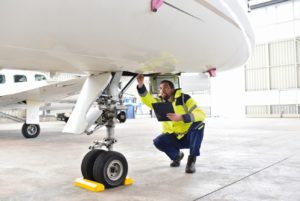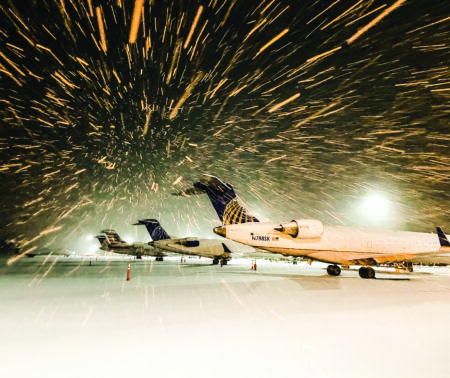Words by Kirstie Pickering
What has been termed “The Great Resignation” is an ongoing economic trend that started earlier this year, when large numbers of people started to quit their jobs voluntarily. There have been several theories as to why this is happening, including the rising cost of living versus stagnant wages, the pandemic giving people time to reconsider their careers, and the quest for a better work-life balance. Regardless of the reasons, the mass of resignations is causing issues in industries around the world.
The trend is particularly challenging for sectors like business aviation, which has many highly skilled roles. “Business aviation is definitely experiencing a talent shortage at the moment,” says Jo Damato, senior vice president education, training and workforce development at the North American Business Aviation Association (NBAA).
“A number of professionals in aviation are considering making a mid-career transition. At the same time, we need pilots and maintenance personnel and it takes a long time to train them. It is an expensive endeavor for them to choose aviation as a career and figure out how to fund it.
“We really want to work on retaining the good people we have in our industry. At the same time, we don’t have time to slow down. We have to keep working on getting that pipeline full from the other end.”
Richard Smith, director of the UK’s Aviation Skills Retention Platform and Talentview Aviation, agrees. He believes the aviation sector needs to focus on raising awareness of the variety of opportunities it has to offer.
“This is important for both encouraging people to stay within the sector, and perhaps transferring their skills to a different role as well as attracting new talent,” he says. “Talent doesn’t just mean young people. There are skills developed in many other sectors that are applicable to aviation – in fact, skills in aviation also migrate to Formula One, wind turbines and developing autonomous vehicles.
“From local airfields to smaller business airports and major international airports, they all require the same overall knowledge, so we need to move the focus away from its sub sectors and prepare the next generation of talent for wider industry requirements and then once they have developed these skills, focus on a particular area.”
The pandemic’s impact
Since March 2020, Covid-19 has had a devastating impact on aviation, including employment. Economic modeling from many academic institutions predict the effects will continue for several years.
“We know that there are multiple factors that cause a person to stay in a position, such as compensation, benefits and work-life balance,” says Damato. “Leadership culture is also important. People don’t leave a bad job – they leave a bad manager.
“During the pandemic, people had time to look at these elements and put them in a priority order. Perhaps they were being very well paid and that made up for an unsatisfactory work-life balance or putting up with a culture that wasn’t great for them. They used to be okay with that, but the pandemic gave us a pause for thinking.”
Retention versus recruitment

While recruitment remains challenging due to a lack of qualified candidates, retaining employees already embedded within business aviation is another concern. While working within business aviation offers a number of perks, it also has factors that some employees may find challenging.
“Business aviation is definitely never boring,” says Róman Kok, from the European Business Aviation Association (EBAA). “This is an industry where people are challenged intellectually and they are always in problem solving mode. You also get to work with the Ferraris and the McLarens of aircraft, which is not something to be underestimated.
“You also get to work with the best equipment, with smart people and you get to see incredibly cool places. On a personal level you can genuinely do some really great network building.
“However, scheduled aviation has a certain offering and the nature of the jobs are more structured. That is something that business aviation – by the nature of its business – will never be able to provide.”
“Both recruitment and retention are important, but they are different issues,” says Marc Bailey, CEO at the British Business and General Aviation Association (BBGA). “With retention, the demographics of some areas in aviation are skewed to the over 55s and because pensions were structured differently in the past, that age group can retire early.
“The ideal is to keep them interested in staying, for both their direct skills and more importantly to pass those skills on to the next generation. But our industry has the advantage that many people love working in aviation.
“Over 90% of aviation careers benefit from starting out on a vocationally trained path. Many career seekers do not even consider a role in aviation. I think we need to turn this tide as soon as possible to help recruitment.”
The next generation

Gen Z is the latest generation to enter the workforce and their outlook and demands are significantly different to previous generations. Many are open to career paths that bypass college or university qualifications altogether, such as mentorships, while others are focused on important causes like sustainability.
“Some of the lower skilled jobs have very low academic barriers to entry, which makes those roles accessible to energized motivated individuals who couldn’t necessarily demonstrate this academically,” says Alex Durand, CEO at SaxonAir.
The EBAA’s STARS (Standards and Training for Aviation Responsibility and Sustainability) program is an initiative set in motion by young business aviation professionals from across the whole of Europe. Their goal is to develop and introduce industry-wide sustainability standards and an accompanying label.
The EBAA also recently announced a partnership with the National School of Civil Aviation (ENAC) in Toulouse, France. The two organizations plan to launch a program that aims at providing STEM students with a more intricate understanding of the business aviation sector.
In the USA, there has been an increase in mentorship programs through organizations such as Women in Aviation, Organization of Black Aerospace Professionals and the National Gay Pilots Association.
“Value alignment is really important,” says Damato. “Younger people seem to be extremely confident in their personal values and look closer at where they might earn their paycheck. I also think that in the past, your industry wasn’t part of your person. You might be an aviation professional and then you might check that in at the door and go and be the rest of yourself.
“But now we’re very much always talking about being your authentic self and bringing your whole self to work, so when they’re looking at determining a career path or figuring out – in our case – business aviation, it’s very much become a personal decision.”
A new era
Business aviation holds much potential for new starters with employers able to offer unique experiences and challenges and it’s important that those pondering an entry into the sector can be excited by this.
“Aviation services presents a plethora of opportunities requiring very different skill sets,” says Bailey.
“Business aviation offers an environment that is similar in many of its practical tasks. However, the delivery of those elements can encompass more that you might see working for a large airline, with many separate departments contributing their part to the product.
“In business aviation, you need competencies to deliver several elements of the service. A simple example of this would be the role of an aircraft captain, who will often have a wide impact on what is provided for the client. The level of potential involvement extends far beyond flying the aircraft.
“For some people, that would offer a greater interest in their role. For others, they might prefer the structure of working to deliver a scheduled service in a defined way.
“My advice would be to get into aviation and obtain the training, skills and competencies that match your education,” he concludes. “When you have your qualifications, you can then look towards what type of working might best suit you.
“Don’t be fooled into believing that working for certain companies puts you at the top of the tree – you might find something else that really supports what you want to get from your career.”





